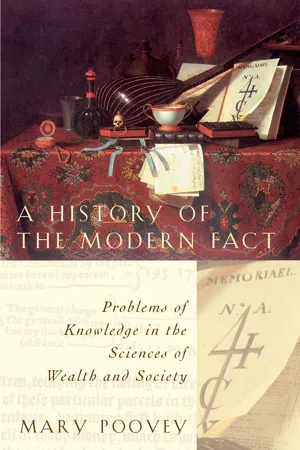
eBook - PDF
A History of the Modern Fact
Problems of Knowledge in the Sciences of Wealth and Society
- English
- PDF
- Available on iOS & Android
eBook - PDF
About this book
How did the fact become modernity's most favored unit of knowledge? How did description come to seem separable from theory in the precursors of economics and the social sciences?
Mary Poovey explores these questions in A History of the Modern Fact, ranging across an astonishing array of texts and ideas from the publication of the first British manual on double-entry bookkeeping in 1588 to the institutionalization of statistics in the 1830s. She shows how the production of systematic knowledge from descriptions of observed particulars influenced government, how numerical representation became the privileged vehicle for generating useful facts, and how belief—whether figured as credit, credibility, or credulity—remained essential to the production of knowledge.
Illuminating the epistemological conditions that have made modern social and economic knowledge possible, A History of the Modern Fact provides important contributions to the history of political thought, economics, science, and philosophy, as well as to literary and cultural criticism.
Mary Poovey explores these questions in A History of the Modern Fact, ranging across an astonishing array of texts and ideas from the publication of the first British manual on double-entry bookkeeping in 1588 to the institutionalization of statistics in the 1830s. She shows how the production of systematic knowledge from descriptions of observed particulars influenced government, how numerical representation became the privileged vehicle for generating useful facts, and how belief—whether figured as credit, credibility, or credulity—remained essential to the production of knowledge.
Illuminating the epistemological conditions that have made modern social and economic knowledge possible, A History of the Modern Fact provides important contributions to the history of political thought, economics, science, and philosophy, as well as to literary and cultural criticism.
Frequently asked questions
Yes, you can cancel anytime from the Subscription tab in your account settings on the Perlego website. Your subscription will stay active until the end of your current billing period. Learn how to cancel your subscription.
No, books cannot be downloaded as external files, such as PDFs, for use outside of Perlego. However, you can download books within the Perlego app for offline reading on mobile or tablet. Learn more here.
Perlego offers two plans: Essential and Complete
- Essential is ideal for learners and professionals who enjoy exploring a wide range of subjects. Access the Essential Library with 800,000+ trusted titles and best-sellers across business, personal growth, and the humanities. Includes unlimited reading time and Standard Read Aloud voice.
- Complete: Perfect for advanced learners and researchers needing full, unrestricted access. Unlock 1.4M+ books across hundreds of subjects, including academic and specialized titles. The Complete Plan also includes advanced features like Premium Read Aloud and Research Assistant.
We are an online textbook subscription service, where you can get access to an entire online library for less than the price of a single book per month. With over 1 million books across 1000+ topics, we’ve got you covered! Learn more here.
Look out for the read-aloud symbol on your next book to see if you can listen to it. The read-aloud tool reads text aloud for you, highlighting the text as it is being read. You can pause it, speed it up and slow it down. Learn more here.
Yes! You can use the Perlego app on both iOS or Android devices to read anytime, anywhere — even offline. Perfect for commutes or when you’re on the go.
Please note we cannot support devices running on iOS 13 and Android 7 or earlier. Learn more about using the app.
Please note we cannot support devices running on iOS 13 and Android 7 or earlier. Learn more about using the app.
Yes, you can access A History of the Modern Fact by Mary Poovey in PDF and/or ePUB format, as well as other popular books in Social Sciences & Science History. We have over one million books available in our catalogue for you to explore.
Information
Publisher
University of Chicago PressYear
2009Print ISBN
9780226675268, 9780226675251eBook ISBN
9780226675183Table of contents
- Contents
- Acknowledgments
- 1. The Modern Fact, the Problem of Induction, and Questions of Method
- 2. Accommodating Merchants: Double-Entry Bookkeeping, Mercantile Expertise, and the Effect of Accuracy
- 3. The Political Anatomy of the Economy: English Science and Irish Land
- 4. Experimental Moral Philosophy and the Problems of Liberal Governmentality
- 5. From Conjectural History to Political Economy
- 6. Reconfiguring Facts and Theory: Vestiges of Providentialism in the New Science of Wealth
- 7. Figures of Arithmetic, Figures of Speech: The Problem of Induction in the 1830s
- Notes
- Bibliography
- Index